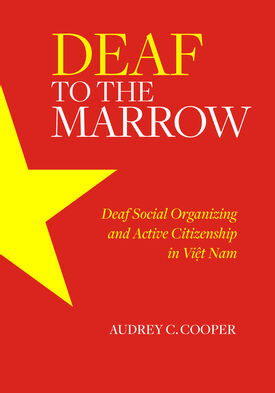
Deaf to the Marrow
Deaf Social Organizing and Active Citizenship in Viet Nam
In this work, Audrey C. Cooper develops ethnographic and language-centered accounts of Deaf social organizing in Viet Nam.
Description
In Deaf to the Marrow, public anthropologist Audrey C. Cooper examines the social production and transformation of ideas about language, bodies, and state-structured educational institutions in southern Viet Nam. Focusing on the reform period (1986 to the present), Cooper describes the ways that signed-language practices, ideologies, policies, and programming shape and are shaped by Deaf people’s social engagement in and around Ho Chí Minh City.
Drawing on research data and work with Vietnamese Deaf colleagues covering an eight-year span, Cooper develops ethnographic and language-centered accounts of Deaf social organizing. These accounts illuminate the ways that Deaf citizens are assuming self-determining roles, or active citizenship, in decisions of local, national, and international importance. By placing Deaf social action in the historical context of state development and modernization projects, Cooper shows how educational structuring reflects dominant, spoken-language-centered views of Vietnamese Deaf people and signed languages. She also addresses the impact of international aid agendas on education, especially those related to disability. Deaf to the Marrow examines perspectives largely ignored in Deaf education, Deaf studies, signed-language linguistics, and anthropological literatures, thereby contributing to scholarship on language and sociopolitical formation broadly and the study of Deaf people’s citizenship practices specifically.
Audrey C. Cooper is a public anthropologist and an assistant professor and director of Gallaudet University’s Masters Program in International Development.
Reviews
"Makes a significant contribution to the growing field of Sign Language Studies...recommendable to not just linguistic anthropologists but also to sign language specialists, educational policy makers, social workers, and those with interest in Southeast Asian postcolonial societies like Viet Nam."
— Journal of Linguistic Anthropology
"This book has much to offer Vietnamese studies, particularly in its analysis of how the modern Vietnamese state stakes its legitimacy on the way it cares for its population, not least its Deaf and disabled citizens."
— Journal of Vietnamese Studies